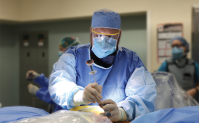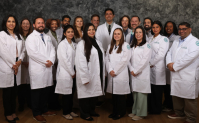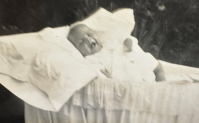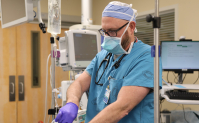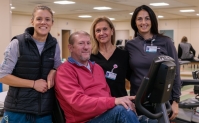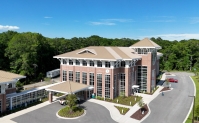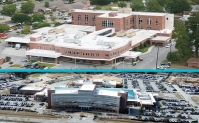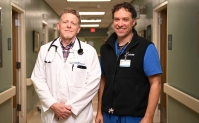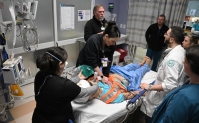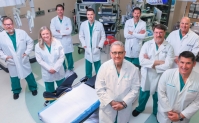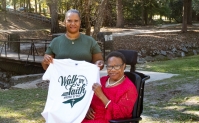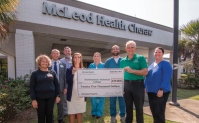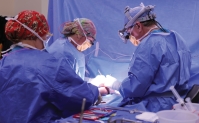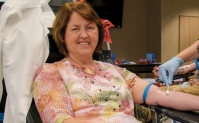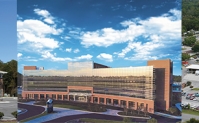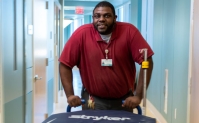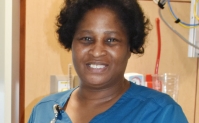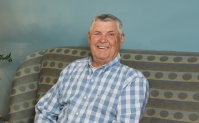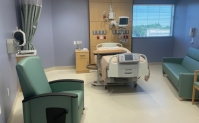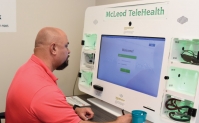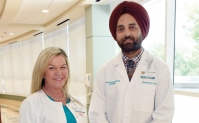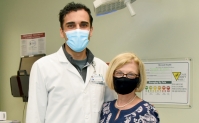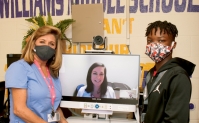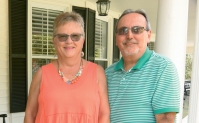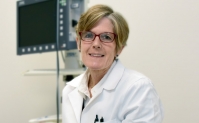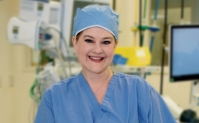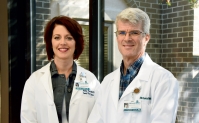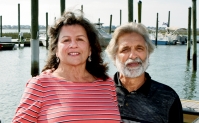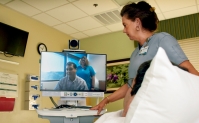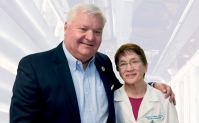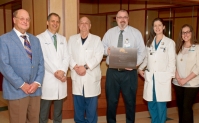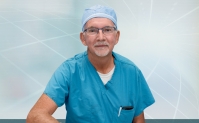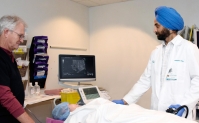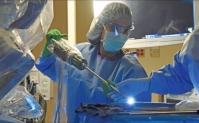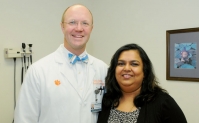You Inspire The Best in Us.
With the many advances in care and treatments, today’s patients have more and more reasons to expect the best outcomes. Here are the incredible stories of our patients and their journeys. Click on a thumbnail and scroll down to view each story.

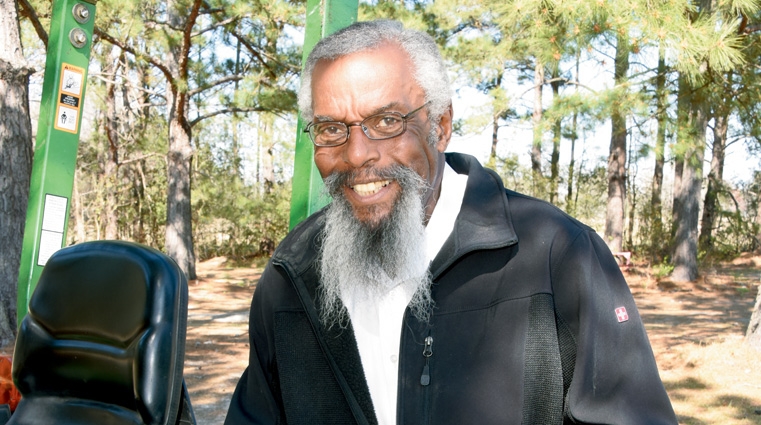
Access Excellence
By Jennifer Hulon
Lawrence McQueen chose to retire where he once enjoyed the quiet country life in his youth.
Currently residing in North Myrtle Beach, Lawrence and his wife, Rosetta, own a small farm in Loris where they plan to build a new home soon. Lawrence spends time on his tractor manicuring the landscape and taking photographs of his beautiful property and wildlife.
In late 2016, the diagnosis of kidney failure interrupted Lawrence’s peaceful retirement. He never imagined his weekly activities would involve making multiple doctor’s appointments and scheduling dialysis sessions, which intrude on his newfound free time.
Lawrence’s condition requires dialysis three times a week. Patients with renal or kidney failure receive dialysis treatments through a process using a hemodialyzer (artificial kidney). Dialysis removes waste, salt and extra water to prevent them from building up in the body. Dialysis also helps keep a safe level of certain chemicals in the blood, such as potassium, sodium and bicarbonate, and assists in controlling blood pressure.
“A way of life for many, especially in the Carolinas, kidney failure necessitates this lifealtering process for patients,” explained McLeod Vascular Surgeon Dr. David Bjerken.
Patients who undergo dialysis weekly require a vascular access, a way to remove blood from the body then return it. Vascular access options include either an arteriovenous (AV) fistula, AV graft or catheter. An AV fistula, the preferred type of vascular access, offers fewer problems with infection and clotting. Catheters pose the most problems with infection.
Experiencing issues with his dialysis access, Lawrence’s Nephrologist Dr. Sivanthan Balachandran referred him to Dr. Bjerken in March of 2017. Lawrence’s dialysis access involved a neck catheter, which led to an elevated temperature, swelling and risk of more systemic complications due to chronic infection. He needed an alternative access option for his dialysis.
Dr. Bjerken suggested Lawrence undergo a procedure to remove the catheter, and he would create an arteriovenous fistula in his forearm. This offered convenient and safe access for dialysis moving forward as well as alleviated the elevated risk of infection.
“Dr. Bjerken and the McLeod Loris staff stayed very attentive and concerned with my well-being,” said Lawrence. “They kept me informed and remained efficient, like a well-oiled machine.” Nearly a year after Lawrence’s procedure, he experienced stenosis or narrowing of his fistula vein, a major cause of dysfunction and a common occurrence with a fistula.
“This past February, when I suspected my fistula was clotted, I contacted Dr. Bjerken,” said Lawrence. “He told me to come to the hospital so he could look at my arm. He made time to see me between surgery cases because he wanted to take care of me. This impressed me greatly and gave me comfort.”
Dr. Bjerken performed a fistulagram imaging test to diagnose Lawrence’s problem and an angioplasty procedure to repair it. Angioplasty involves inserting a catheter through a blockage in an artery and inflating a special balloon on the catheter to open up the blockage and allow more blood to flow through it.
Patients with a graft, catheter or fistula require immediate attention if the vascular access becomes damaged or inoperable. However, few healthcare centers provide prompt dialysis access care which produces a significant problem for dialysis patients.
“The number of patients with kidney failure continues to increase rapidly, up 600 percent since 35 years ago,” said Dr. Bjerken. “We knew a response to this growing problem needed to be addressed.”
Because of the critical need for this specialized area of vascular care, McLeod Loris recently established a Dialysis Access Center for the region. Dr. Bjerken, the lead physician of the center, and the staff provide treatment for patients with access complications in a timely manner.
“Changes in health care continue to occur, and at McLeod we strive to respond to these needs while emphasizing quality and service,” Dr. Bjerken said. “A complex process involving multiple facets of our system, dialysis access challenges me to perform at my best for our patients.”
McLeod Loris Administrator Scott Montgomery added, “McLeod Loris remains committed to meeting the needs of our community. Working with Dr. Bjerken, we identified a deficit in serving patients with vascular access needs. By establishing the Dialysis Access Center at McLeod Loris, we are expanding our ability to provide the highest quality of service to these patients.”
“Kidney failure patients like Lawrence need these life preserving dialysis treatments,” said Dr. Bjerken. “However, creating and maintaining effective access for dialysis is a constant challenge. A priority for Lawrence involves a kidney transplant because it offers him a significant longevity benefit.”
“Dr. Bjerken is fantastic and magnificent in every way,” said Lawrence. “He’s the best.”
Now a kidney transplant candidate, Lawrence looks forward to ending his need for dialysis and further improve his quality of life.
-
McLEOD REGIONAL MEDICAL CENTER FLORENCE
843-777-2000 -
McLEOD DARLINGTON
843-777-1100 -
McLEOD DILLON
843-774-4111 -
McLEOD LORIS
843-716-7000 -
McLEOD SEACOAST
843-390-8100 -
McLEOD CHERAW
843-537-7881 -
McLEOD CLARENDON
803-433-3000



-
McLEOD REGIONAL MEDICAL CENTER FLORENCE
843-777-2000 -
McLEOD DARLINGTON
843-777-1100 -
McLEOD DILLON
843-774-4111 -
McLEOD LORIS
843-716-7000 -
McLEOD SEACOAST
843-390-8100 -
McLEOD CHERAW
843-537-7881 -
McLEOD CLARENDON
803-433-3000
 Find a Doctor
Find a Doctor  Locations
Locations  Services
Services 